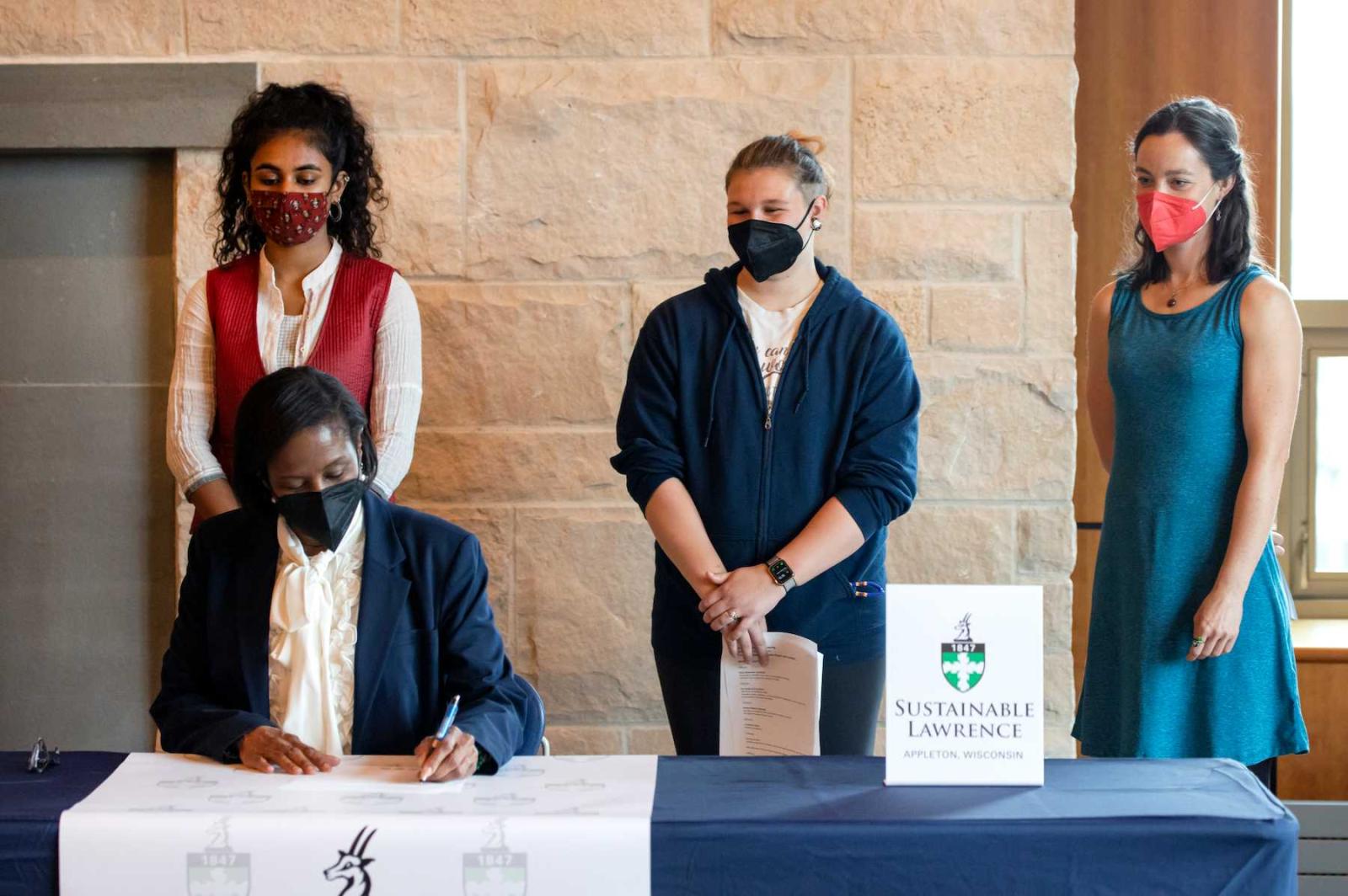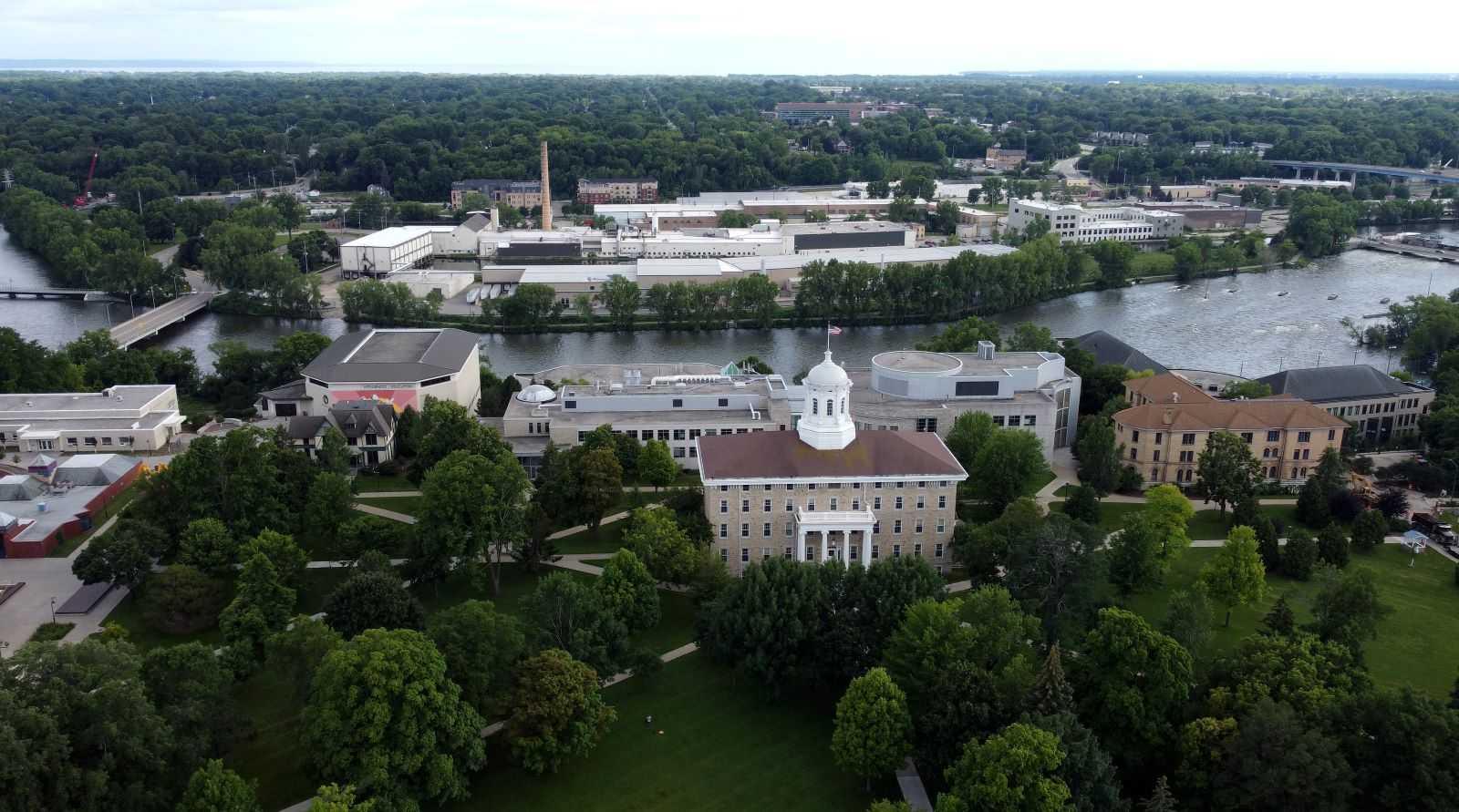
President Laurie A. Carter signs the Climate Commitment as (from left) Adya Kadambari, Em Gajewski, and Relena Ribbons look on. (Photo by Danny Damiani)
President Laurie A. Carter signed a Second Nature Climate Commitment on Friday, pledging Lawrence University to accelerate climate action on campus and be a sustainability leader in the community.
The commitment, signed on Earth Day, will continue sustainability work already under way on campus, will set Lawrence on a path to develop a Climate Action Plan over the coming three years, and will put in place mechanisms to track and evaluate progress.
Lawrence joins dozens of other colleges and universities across the country that have signed on with Second Nature—part of the Climate Leadership Network—to help lead the way amidst mounting global climate challenges.
“We believe firmly in the power, potential, and imperative of higher education’s key role in shaping a sustainable society,” Carter said as she shared the Second Nature message with students, faculty, and staff gathered on campus to witness the signing. “We believe carbon neutrality and resilience are extremely high priority areas of action for all institutions and we aim to lead the nation in these efforts. We urge others to join us in transforming society toward a sustainable, healthy, and more prosperous future.”
Second Nature is a nonprofit organization committed to accelerating climate action in, and through, higher education. It does so by mobilizing a diverse array of higher education institutions to act on bold climate commitments, to scale campus climate initiatives, and to create innovative climate solutions.
The signing of the Climate Commitment was applauded by Lawrence students who have pushed for such a public commitment and by faculty who have led sustainability initiatives through Lawrence’s Sustainability Steering Committee.
“The changes we hope to see in the world have so much scope in the realm of environmental and racial justice and it is our duty to make commitments such as these and hold ourselves accountable,” junior Adya Kadambari, a government major, said at the signing ceremony. “It is our duty to push those in power to make commitments such as these and hold them accountable.”
Relena Ribbons, an assistant professor of geosciences and member of the Sustainability Steering Committee, said the Climate Commitment is the next step to build on the work already happening at Lawrence. She pointed to Lawrence’s ongoing efforts to make Bjorklunden, its Door County retreat, carbon neutral, to student-led efforts to develop and care for a sustainable campus garden, and to faculty-student collaborations on everything from waste reduction to pollinator advocacy.
“Students continue to be the driving force behind this movement, and we support their commitment and dedication to this work,” Ribbons said.
The Climate Commitment calls on Lawrence to:
- Create an internal institutional structure to guide the development and implementation of the plan within two months of signing.
- Develop a comprehensive Climate Action Plan within three years of signing the commitment. This includes a target date for achieving carbon neutrality.
- Create mechanisms and indicators for tracking progress.
- Complete an annual evaluation of progress.
“I am excited that Lawrence will join the institutions across the country that have made this vital commitment,” Carter said. “It is an important reflection of our values and the university’s dedication to a sustainable future.”
Em Gajewski, a sophomore serving as president of the student organization LUNA (Lawrence University Native Americans), told those gathered that it is imperative that we all embrace our responsibilities to care for this planet.
“If we treated Earth as our family, if we gave her the respect she deserves, imagine how beautiful our world would be,” she said.
Gajewski, a double major in biology and ethnic studies, is a member of the La Courte Oreilles Ojibwe.
Kadambari urged students, faculty, and staff to work together in tackling climate issues. Join groups. Get organized. Push for change. Lawrence is doing just that as it becomes part of the Climate Leadership Network.
“Climate change is a daunting and existential problem that we are all aware of and yet dialectically ignorant to, and as much as we all want to be the sole hero of the world, our real power lies in relentless and resilient organization,” Kadambari said.
Look no further than the comeback of the Fox River for hope that dedicated, persistent action can make a difference, Ribbons said. Lawrentians can witness the vibrant caddisfly population and the bald eagles that now frequent the river near campus and know that this healthy ecosystem was an ecological disaster just a few decades ago. It is evidence right in front of us that shows sustainability initiatives really do work.
“The Fox River reminds us of the legacy of environmental harm from land stewardship gone awry, as well as the power of sustained efforts toward environmental remediation, protection, and advocacy,” Ribbons said.
An investment in environmental sustainability is an investment that will make a difference for this and future generations on and off campus, she said as she applauded Carter’s signing of the Climate Commitment.
“As a residential college, we can demonstrate learning about sustainability while living sustainably,” Ribbons said. “The signing of this commitment marks the beginning of a new chapter of continued action and commitment to climate initiatives.”




